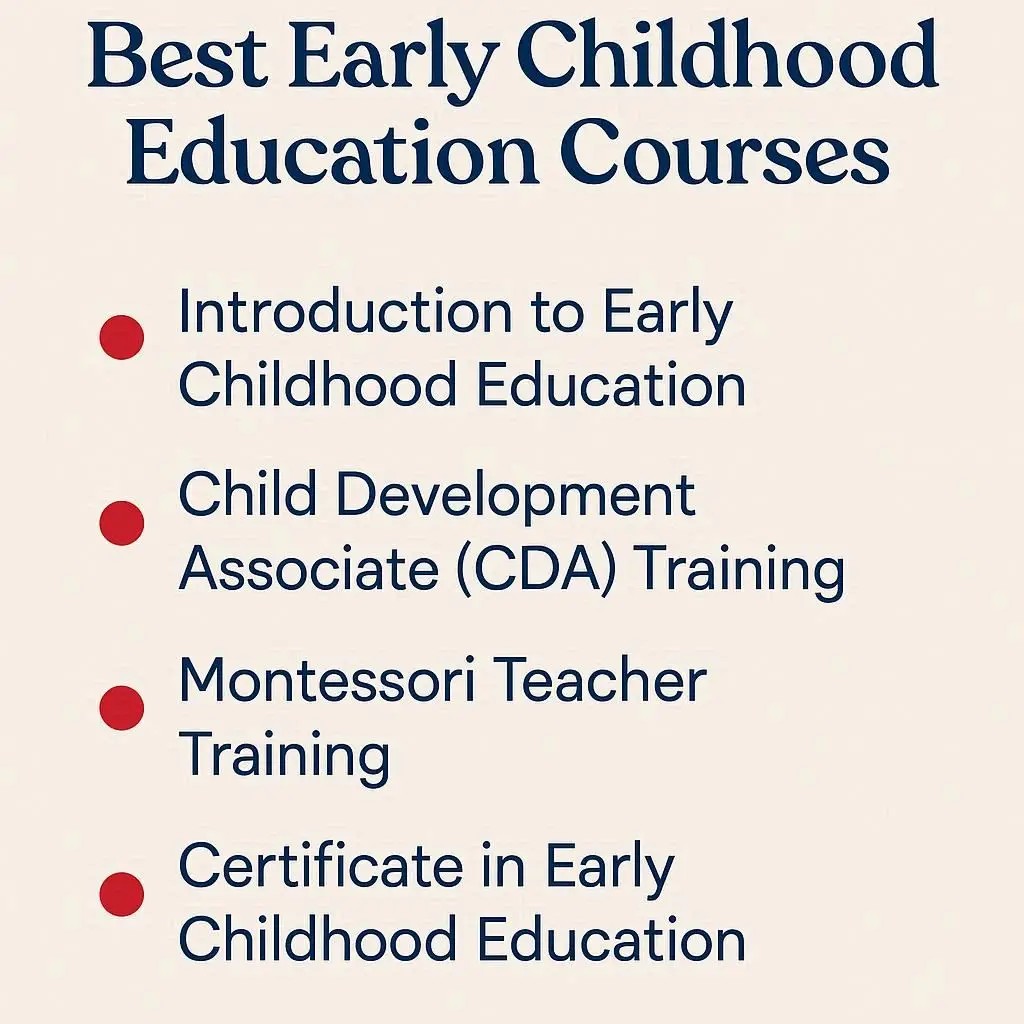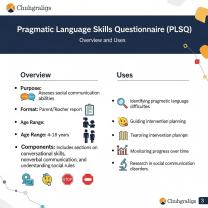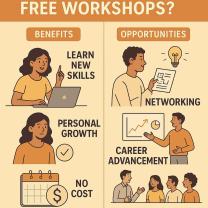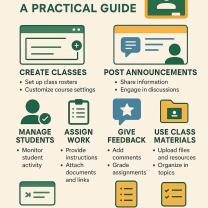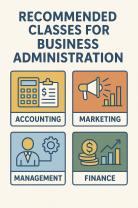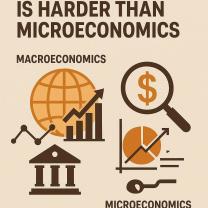What is the best early childhood education course?
Executive Summary: Defining "Best" in Early Childhood Education
The pursuit of the "best" early childhood education (ECE) course is not a quest for a single, definitive answer, but rather a strategic process of aligning educational credentials and professional goals with personal circumstances. The ideal path is a tailored one, representing a careful synthesis of an individual's career aspirations, learning preferences, and financial considerations. This report provides a comprehensive framework for navigating the diverse landscape of ECE programs, offering a structured approach to evaluating degrees, certifications, curriculum, learning modalities, and career trajectories.
A critical initial distinction must be made to avoid a common pitfall in online research: while the user's query pertains to Early Childhood Education, the acronym ECE is also widely used to denote Electrical and Computer Engineering. A quick search for "ECE" can yield results for highly technical programs in areas like computer security, wireless systems, and semiconductor devices, which are entirely unrelated to the study of young children.
VLSI Design, Quantum Physical Electronics, and AI/ML Systems.
child development, curriculum design, and classroom management.
The following analysis is structured as a multi-dimensional assessment tool. It begins by examining the foundational credentials recognized in the field, from academic degrees to professional certifications. It then delves into the core topics of a quality ECE curriculum and evaluates the advantages of different learning formats, including the crucial role of hands-on experience. Finally, the report maps educational paths to specific career opportunities and provides a checklist for identifying high-quality institutions. This holistic approach empowers a prospective student to construct their own "best" educational path, moving beyond a generic recommendation to a personalized roadmap for success.
Part 1: The Foundation - Degrees and Certifications in Early Childhood Education
Navigating the educational landscape of early childhood education requires a clear understanding of the hierarchy of credentials, which range from entry-level professional certificates to advanced academic degrees. Each credential serves a distinct purpose and aligns with different career stages and goals.
Navigating Academic Degrees
Formal academic degrees in ECE provide a structured pathway for professionals, with each level building upon the last and opening doors to a wider range of career opportunities.
Associate Degree: The Associate of Arts (A.A.) or Associate of Science (A.S.) is a two-year program that serves as a foundational credential.
Bachelor's Degree: A four-year Bachelor of Arts (B.A.) or Bachelor of Science (B.S.) is widely considered the standard for aspiring classroom teachers.
Graduate Degrees: For individuals seeking to deepen their expertise, qualify for leadership roles, or pursue careers in research, graduate-level education is the next step.
The Role of Professional Certifications
Beyond academic degrees, a number of professional certifications serve as valuable credentials that demonstrate specialized knowledge and a commitment to quality.
Child Development Associate (CDA): Provided by the Council for Professional Recognition, the CDA is a nationally recognized credential for early childhood educators.
Certified Childcare Professional (CCP): Offered by the National Early Childhood Program Accreditation (NECPA), the CCP is a distinguished credential for early childhood educators, especially those who do not hold a college degree.
National Administrator Credential (NAC): For professionals with aspirations in leadership and management, the NAC is a prestigious certification provided by the National Child Care Association (NCCA).
Table 1: ECE Degrees & Certifications at a Glance
| Credential Type | Typical Time to Complete | Common Career Roles | Primary Function / Value |
| Associate Degree (A.A., A.S.) | 2 years | Childcare Worker, Teacher Assistant, Recreation Worker | Entry-level qualification, foundational knowledge, transferable credit toward a bachelor's degree. |
| Bachelor's Degree (B.A., B.S.) | 4 years | Preschool Teacher, Kindergarten Teacher, Elementary Teacher | Minimum requirement for public school teaching and state certification. |
| Master's Degree (M.A.E., M.Ed.) | 1–3 years | School Counselor, Curriculum Developer, Educational Administrator | Advanced knowledge, leadership roles, higher starting salary, career acceleration. |
| Doctorate (Ph.D., Ed.D.) | 3–5 years | University Professor, Researcher, Policymaker | Highest level of expertise for academic and research-focused careers. |
| Child Development Associate (CDA) | ~120 hours training | Preschool Teacher, Daycare Provider, Head Start Teacher | Nationally recognized, entry-level credential; a stepping stone for career advancement. |
| Certified Childcare Professional (CCP) | ~150 hours training | Experienced Early Childhood Educator, Childcare Center Director | A distinguished national credential for those without a college degree. |
| National Administrator Credential (NAC) | Varies | Childcare Center Director, Program Manager, Owner | Focus on leadership and management; a prestigious credential for aspiring administrators. |
Part 2: The Core of ECE - Foundational and Advanced Topics
Early childhood education programs are built on a consistent set of core topics that provide a holistic understanding of child development and effective teaching methodologies. These curricula are designed to be transdisciplinary, covering not only academic subjects but also the social, emotional, and physical well-being of young children.
Foundational Curriculum
A quality ECE curriculum will consistently cover the following key areas, which are considered essential for preparing a competent educator:
Child Development: This is a central and non-negotiable component of all ECE programs. Courses delve into the major milestones of social, emotional, physical, and cognitive development in children from birth to age eight.
Learning Theories & Pedagogy: This area focuses on the "how-to" of teaching. Students learn various educational philosophies, including play-based learning and inquiry-based learning, which emphasize hands-on activities to stimulate a child's natural curiosity.
Health, Safety, & Nutrition: These are essential, practical topics that ensure an educator can provide a secure and nurturing environment. Coursework in this area often includes training for CPR, first aid, and specific certifications related to health and safety, such as those for SIDS and abusive head trauma.
Inclusion & Special Needs: Modern ECE programs place a strong emphasis on preparing educators to work with diverse populations. Coursework in this area covers strategies for supporting children with special needs and creating inclusive learning environments that value every child's background, culture, and unique abilities.
Beyond the Classroom: The Administrative and Leadership Track
A deeper analysis of ECE curricula reveals that many programs are not exclusively focused on preparing professionals for a role as a classroom teacher. A significant number of degree and certificate programs integrate topics related to leadership, management, and program administration.
For instance, course titles such as Program Administration for Early Childhood and required topics like business management, staff recruitment, and budget management are explicitly mentioned as part of the curriculum.
Part 3: The Learning Modality - Online vs. In-Person Programs
The choice between online and in-person learning is a pivotal decision for any prospective ECE student. While some educational experts believe that online learning can hinder a child's social development and limit hands-on learning
The Advantages of In-Person Learning
The traditional classroom setting offers unique and proven benefits, especially for a field as interactive as ECE.
Social and Hands-on Learning: In-person programs provide a physical environment where students and educators can engage in face-to-face interaction, fostering a sense of community and collaborative learning.
Immediate Feedback: In-person instruction provides opportunities for one-on-one communication with faculty and peers, which can be beneficial for real-time clarification and deeper understanding of complex topics.
The Advantages of Online Learning
For working professionals, parents, and those in remote locations, online programs offer a level of flexibility and accessibility that traditional models cannot match.
Flexibility and Accessibility: The primary benefit of online ECE programs is the ability to study from anywhere and on a schedule that accommodates a busy life.
Cost-Effectiveness: Online learning can be more affordable than in-person education due to reduced tuition fees, as well as savings on transportation and other expenses associated with a physical campus.
Diverse and Engaging Curriculum: Online programs can feature a variety of learning materials, including live and recorded lectures, online forums, and digital assignments.
The Hybrid Model: Integrating Hands-on Experience
The perception that online ECE programs lack hands-on experience is a key point of confusion for many prospective students. While some sources highlight the lack of social interaction and limited hands-on learning as drawbacks of online instruction, a deeper look at the research reveals that high-quality online programs have successfully integrated this critical component.
The most effective online ECE programs are not purely virtual; they operate on a hybrid model that requires mandatory in-person field experience.
Table 2: Online vs. In-Person Learning: A Comparative Analysis
| Factor | Online Learning | In-Person Learning |
| Flexibility | Pros: Flexible scheduling, year-round start dates, and self-paced learning are ideal for working adults. | Cons: Requires adherence to a rigid, fixed class schedule and physical presence on campus. |
| Cost | Pros: Lower tuition, no commuting costs, and savings on housing and meal plans. | Cons: Can be expensive due to tuition, transportation, and supplies. |
| Hands-on Experience | Pros: Many programs integrate mandatory field experience, internships, and practicums in local licensed centers. | Pros: Offers numerous opportunities for direct, sensory-rich, and interactive learning. |
| Social Interaction | Cons: Potential for isolation and limited opportunities to engage with peers and faculty in person. | Pros: Fosters a supportive learning community and provides face-to-face opportunities for collaboration and friendship. |
| Self-Motivation | Cons: Requires a high level of self-discipline and time management skills to stay on track. | Pros: Structured environment and physical class presence can reduce distractions. |
Part 4: Connecting Learning to Livelihood - ECE Career Pathways
Choosing an ECE program is a strategic decision that should be directly informed by a professional's long-term career goals. The field offers a diverse range of opportunities, and specific credentials are often prerequisites for certain roles. A careful alignment of educational investment with desired career outcomes is essential for success.
Mapping Credentials to Careers
The research clearly outlines a direct correlation between the level of education attained and the professional roles available.
Associate Degree: This two-year credential is the primary entry point for numerous ECE roles. Graduates are well-prepared for positions such as childcare workers, recreation workers, and teacher assistants.
Bachelor's Degree: For those aspiring to work in a classroom setting, a bachelor's degree is the standard qualification. This credential is required for roles such as preschool, kindergarten, and elementary school teacher in most public and private schools.
Advanced Degrees & Specializations: Higher education beyond the bachelor's level opens the door to leadership and specialized, high-paying roles.
Table 3: ECE Career Pathways & Credential Requirements
| Career Role | Typical Entry-Level Education / Credential | 2024 Median Pay | Key Responsibilities |
| Preschool Teacher | Associate's degree or CDA | $37,120 | Educates and cares for children under age five, focusing on basic skills and creating lesson plans. |
| Kindergarten / Elementary Teacher | Bachelor's degree | $62,310 | Manages a classroom, develops educational programs, and provides foundational academic instruction for young students. |
| Daycare / Childcare Center Director | Bachelor's degree and experience; may require a national credential | $56,270 | Oversees all daily operations of a childcare center, including staffing, budgeting, and parent relations. |
| Special Education Teacher | Bachelor's or Master's in Special Education | $64,270 | Works with students who have a wide range of learning and physical disabilities, adapting curriculum to meet their unique needs. |
| School Counselor | Master's degree | ~$81,889 | Helps students develop coping mechanisms, provides emotional support, and creates a safe space for expression. |
| Curriculum Developer | Bachelor's degree and teaching experience; often requires a Master's degree | Varies widely; often higher than teaching roles | Designs, develops, and improves teaching plans and curricula for public and private school systems. |
Part 5: Indicators of Program Excellence - Choosing a High-Quality Institution
Selecting a program is about more than just matching a degree type to a career; it is about choosing a high-quality institution that will provide a robust and relevant education. This requires an expert-level evaluation that goes beyond a program's name or a school's general reputation.
The Power of Accreditation
Program accreditation is the single most important indicator of a program's quality.
Specialized Accreditation is Key: The National Association for the Education of Young Children (NAEYC) and the Council for the Accreditation of Educator Preparation (CAEP) are the primary accrediting bodies for ECE programs.
Why it Matters: NAEYC-accredited programs are committed to providing rich, hands-on experiences that allow students to learn and apply their understanding of professional standards.
Other Quality Markers
Beyond accreditation, several other factors contribute to a program's excellence and should be considered during the selection process.
Faculty Expertise and Curriculum: A high-quality program is led by faculty who are not only passionate about teaching but are also engaged in cutting-edge research and professional practice.
real-world applicationsand a focus oninnovative pedagogical practices.Developmentally Appropriate Practice(DAP), is a sign of a program's commitment to quality.Practical Experience: The ability to apply knowledge in a real-world setting is paramount. A quality program will include
clinically embedded coursesandprofessional experienceslike internships and student teaching, often in partnership with local organizations and schools.State-Specific Requirements: A degree or certification alone may not be enough to qualify an individual to work. State and territory governments set minimum health and safety requirements for child care programs, which can include staff qualifications, background checks, and specific training like CPR and first aid.
Conclusion: A Personalized Roadmap to Success
The notion of a single "best" course is a false premise. The optimal educational path in early childhood education is a unique calculation, meticulously aligning a professional's aspirations with the right credentials, curriculum, and learning environment. By reframing the initial question, this report provides a strategic framework for making an informed and impactful career decision.
The synthesis of the analysis culminates in a final, actionable checklist designed to guide a prospective student through the selection process:
Define Your Destination: Begin by identifying your specific career goal. Do you aspire to be a preschool teacher, a daycare director, or a special education specialist? Your destination will dictate the necessary credentials.
Determine Your Credential: Refer to the career pathways table to determine the minimum and ideal credentials required for your target role. This will clarify whether an associate, bachelor's, or advanced degree is the most suitable starting point.
Assess Your Circumstances: Evaluate your personal and professional circumstances to choose the learning modality that best fits your life. Acknowledge that a high-quality online program will include mandatory, in-person field experience.
Confirm Program Quality: Prioritize programs that are accredited by a specialized body like NAEYC. Look for evidence of strong faculty, relevant curriculum, and extensive hands-on experience.
Validate State Requirements: Before enrolling, confirm that the program meets all state-specific licensing, training, and background check requirements for your intended location of employment.
By following this strategic roadmap, a prospective ECE professional can move beyond the general search for the "best" course and embark on a well-planned educational journey that leads to a rewarding and impactful career.
